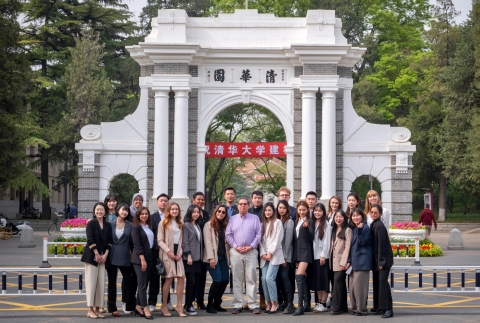
The Global Business Journalism program has set a final deadline of April 15 for top college seniors and mid-career journalists to apply to the prestigious two-year master’s degree program at Tsinghua University in Beijing.
The English language program, a partnership between the International Center for Journalists and Bloomberg News, is taught by veteran international journalists and Chinese experts in business, economics and academic research.
After a four-year slump in applications caused by the COVID-19 pandemic, the program has bounced back strongly in international applicants over the past two years, particularly among working journalists, said co-director Rick Dunham said.
“It has been a top priority of ours to increase the number of mid-career reporters who join our program,” said Professor Dunham, a former White House correspondent and Washington bureau chief. “These journalists are able to learn the latest technologies, study in a diverse educational environment, experience the economic reality of China and East Asia, and supercharge their careers.”
Because of a continuing wave of inquiries from college seniors who are still deciding on their plans for the next academic year, the program decided to extend its final deadline by two weeks to April 15 from April 1. Two rounds of applications have been completed. The new third-round deadline is March 28 at 5 p.m., Beijing time.
Prospective applicants for the 2025-2026 academic year can get detailed information and tips for applying on the GlobalBusinessJournalism.com website. They must formally apply on the official Tsinghua graduate school site.
The GBJ Admissions Committee has already conducted two rounds of admissions interviews and will conduct additional interviews at the end of March. The final interviews will be scheduled in mid-April. All candidates should receive updates about their status by late April.
“Our incoming class promises to be our most diverse ever, with talented applicants from Africa, Europe, Asia and the Americas,” said Professor Dunham. “It is a testament to our reputation for academic excellence, intellectual creativity and multicultural cooperation – with a big assist from the free technology provided on site by Bloomberg and Tsinghua.”
Founded in 2007, the Global Business is the first English language journalism master's program in China, and it remains the only business journalism master's program on the Chinese mainland. Tsinghua University is widely considered Asia's top university and the Tsinghua School of Journalism and Communication has been ranked as China's top graduate school of journalism.
GBJ has built a stellar reputation for enhancing the quality of business journalism around the world and preparing a multimedia-savvy group of young journalists for the rapidly changing media landscape. The program has trained about 550 students from 76 nations, and its alumni have worked for some of the leading news agencies in the world, including Bloomberg News, the Associated Press, the Wall Street Journal, Reuters, Agence France-Presse, CGTN and CNBC.
The program – featuring both Chinese and international students – provides a challenging, multicultural education teaching how the cover the intricacies of global economics, finance and business. The faculty, composed of veteran international journalists, Chinese media scholars and economics experts teaches students how to skillfully cover China’s economy and the rapidly changing world economy.
Global Business Journalism offers an array of specialized courses including data mining, corporate strategies, international accounting standards, multimedia journalism, New Media practice, advanced news writing, intercultural communication, and documentary filmmaking. The program also offers internship opportunities at major media organizations.